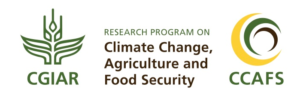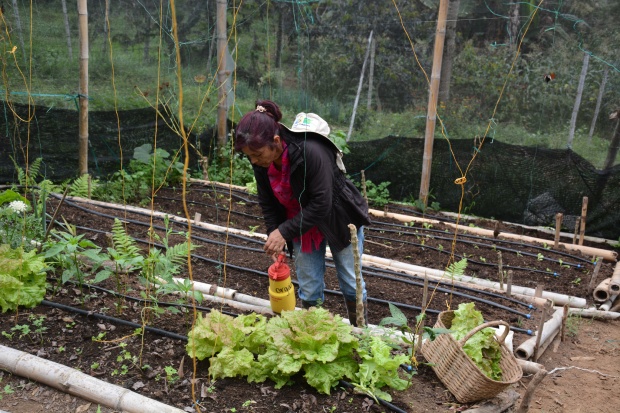 Article in collaboration with: CGIAR Research Program on Climate Change, Agriculture and Food Security (CCAFS) seeks to address the increasing challenge of global warming and declining food security on agricultural practices, policies and measures through strategic, broad-based global partnerships.
Article in collaboration with: CGIAR Research Program on Climate Change, Agriculture and Food Security (CCAFS) seeks to address the increasing challenge of global warming and declining food security on agricultural practices, policies and measures through strategic, broad-based global partnerships.
We visit the Climate-Smart Village of Cauca with Lighthouse Farm, to learn more about the changes that climate-smart agriculture has brought to this community.
The transformative process involved in implementing climate-smart agriculture (CSA) practices can be well observed in the villages of Los Cerrillos and El Danubio in the Cauca department of Colombia where a Climate-Smart Village (CSV) site is located. CSV is an initiative of the CGIAR Research Program on Climate Change, Agriculture and Food Security (CCAFS) in conjunction with the Ecohabitats Foundation and these two communities were chosen to be part of the project due to their vulnerability to climate change and high dependence on agricultural activities.
Related topics: De-risking agricultural value chains using climate-smart agriculture – Investment in Climate-smart Agriculture: Why Do it Now – Measuring Progress Towards Sustainable Agriculture
Since then, CSA practices have not only made each farmer in this area change the way they cultivated their farm and understood the climate, but they also triggered social change at the community level as they led farmers to take a more active role in the food security and household income of their families.
We visited the Cauca CSV with Vivian Valencia, a Researcher at Wageningen University & Research (WUR) and Coordinator of the WUR Lighthouse Farm project, to learn about the experiences of the farmers of this community implementing CSA practices. Our first stop was the Piedranegra farm, owned by Alfredo and Ana Cecilia, two farmers who have participated since the beginning in the implementation of adaptation processes and climate-smart practices.
Don Alfredo began to keep a record of the rain patterns in his village eight years ago, based on the forecasts he followed through the radio. What was born out of curiosity, became the seed to make climate-smart decisions now. Thanks to the training and information he received, to the rain gauge and thermometer installed on his farm and to the CSV process, he knows when and what to plant according to the weather conditions. This is not only a reality for Don Alfredo; producers of Cauca CSV now understand the dynamics of their production systems and can make decisions according to the agroclimatic information available.
Don Alfredo’s farm is a great example of how to apply adaptation measures and constant learning. On his farm, you can find home gardens, organic fertilizer and irrigation systems, among other CSA practices through which he secures food for his own family and generates a surplus. Via selling the surplus in the organic market led by the Corporación Autónoma Regional del Cauca (CRC) he also makes an extra income. The person in charge of this commercial work at the organic market is Ana Cecilia.
There is a total change in our way of life. In mine—in the commercial part—I’ve learned various things and I also transfer the knowledge to the community. Since we started there has been a significant change in how we process the food, how we consume it, and also in the commercial part. It is very important that people learned to put a value on what they produce, because before they said it had no value, and now they attach a monetary value to cultivating crops or having them as food. The surplus also produces extra income that goes to the family.
Ana Cecilia, farmer from CSV Cauca
Exploring cooperation scenarios
Vivían Valencia visited the CSV and learned about the different projects CCAFS works on in order to explore cooperation possibilities between the program and the Lighthouse Farm project. “It’s interesting to see how producers are using this climate information; how that information has changed their decision making processes and how this is reflected in their harvests, in taking more risks, in using new crops” she said.
The knowledge that the producers in Cauca CSV posess about the implementation of climate-smart practices raises many research opportunities. Researchers can investigate, from their project perspective, how the farmers’ practices have changed, how their crops have changed and how this translates into changes at the landscape level and in decision making processes. Research on climate information, nutrition, dietary diversity, among others, are also a possibility. Furthermore, within the framework of the International Center for Tropical Agriculture (CIAT) initiative on Sustainable Food Systems, there are also many opportunities to collaborate and join forces to deepen the research on these global challenges in the context of climate change.
About the author: Lauren Sarruf Romero is the Communications Officer for CCAFS Latin America.
EDITOR’S NOTE: The opinions expressed here by Impakter.com columnists are their own, not those of Impakter.com. Photo Credit: Lauren Sarruf Romero (CCAFS – CIAT)









